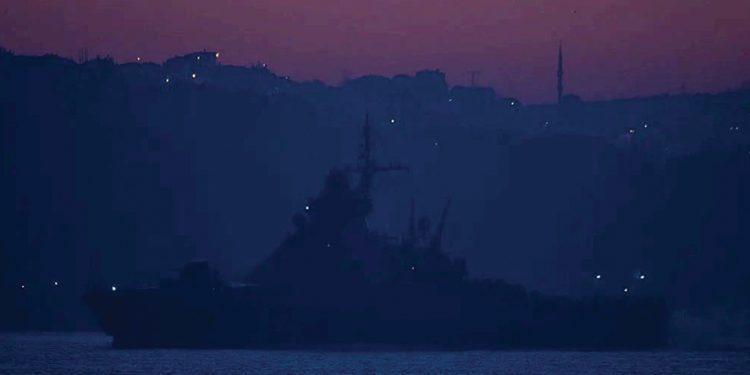The number of threats to our security has not decreased but increased. This is not only unfavorable, but in some cases downright embarrassing. First and foremost, there is the degradation and neutralization of Georgian institutions, and the state and political thinking of Georgians. Not only is it no longer encouraged to take initiative, but even being in the line-up of decision-makers is risky. In another case, when you ask your opponent “Do you want war?” during a discussion about security, the current situation has equated Georgian security policy, except for some enthusiasts and experts in this field, with inaction, inertia and tolerance under guise “peace policies”. The processes around us imply the exact opposite.
The current election campaign has a negative impact on the national political discourse and leads to a paralysis in critical thinking about pressing security issues. In response, it has become crucial to foster a lively, professional discussion in academic and analytical circles, which will help unite opinions and maintain dynamic thinking. This effort aims at integrating thoughtful discourse into Georgian State Policy over time. The intention is to provide readers traditional or experimental insights in order to stimulate public discussion.
The security dilemma: on the edge between “war or peace?”
The concept of “security dilemma” is one that is particularly amorphous in international relations. Since the 1950s, academics have tried to define their scope. However, these attempts have not been able to change the amorphous nature the “security problem.”
The essence of this concept, as it is applied to our case, can be simply stated as follows: How clear and bold Georgia must be in declaring its security doctrine and implementing it in order for both goals to be achieved equally: on the one hand to effectively enhance its own defense capability, and on another hand to not inadvertently upset regional balance or give its neighbors an impression that its real intentions are to cause escalation.
In greater detail, the proposed understanding has several critical components. These include maintaining the desired balance of military capabilities for attack and defense, avoiding the “proxy” role in an era where great power competition is resurgent, etc. These and other subquestions require a competent and continuous discussion between specialists and decision makers.
In the context this publication, we chose to link the above-mentioned paradox with the metaphor of “war or peace”, which is well-known to the Georgian society. If approached with a healthy and non-speculative approach, the “security problem” will remain for the foreseeable to be a major concern for Georgia’s future political forces as well as its security system.
Regional Mystery
The Black Sea and South Caucasus region, as a natural extension of the Black Sea, has become a field of competition for global and regional players. It would have been difficult to imagine this a decade ago, if not for the wars in Ukraine, Armenian-Azerbaijani conflicts, the hot phase in the conflict in East, and other factors that weighed Georgia and its neighbors down with conflicting geopolitical interest.
In this small region, various influences–cultural, economic, military, and diplomatic–are converging, leading to efforts to establish a new balance of power in the South Caucasus. The region is currently in a “geopolitical cloud” that could clear up under different scenarios. This article will not only cover many relevant topics, but also focus on the key issues relating to Georgia’s security.
Black Sea Potential
The wider Black Sea region is unique in that it offers both opportunities and threats. It is true that without the crises, which are known to the readers, the models for practical security policy, about which we can now speak, would remain purely theoretical.
One possible model is the creation a systemic, institutionally organized Black Sea Security Alliance of the Black Sea Countries (with the obvious exception of the Russian Federation).
Mini-alliances or minilateralism are becoming more common in today’s security landscape. They are an effective way to ensure stability and deterrence by collaborating among countries that share a similar geography. This approach was tested in the Indian Ocean and Pacific region and could benefit the Black Sea region. A Black Sea mini alliance would be a rethinking traditional security concepts, and could be a complement to larger alliances such as NATO. This alliance could also extend its focus beyond defense, as seen through discussions about initiatives such as the Black Sea Declaration.
It is also worthwhile considering turning a systematized approach into a new impetus for development of the Georgian industrial and military complex, and the creation of defense and economic infrastructure (including advanced technologies), necessary for the operation of the alliance mentioned above.
In the Black Sea Region, there are solid preconditions that have been formed over the past decades. These preconditions envisaged and still envisage regional formats of collaboration today. In this regard, it is important to note the contribution made by various Georgian authorities and, in some cases, even their proactive stance. The Black Sea Region, with the restoration in Georgian proactivity, and the wave of events taking place around our country, requires a transition from a previous level of cooperation to a more integrated security system.
The Black Sea mini-alliance, despite the diversity of geopolitics and politics in the region is as relevant and interesting. Why?
(a) Before the formation of an officialized bloc, a regional association can be initiated as a single network with gradual increases in cooperation and integration.
(b) In conjunction with the multilateral or bi-lateral security and defense ties that we have already mentioned the proposed mini alliance allows for the development a system horizontal linkages between the participating countries.
I have already mentioned diversity, and I believe that the format proposed allows countries who follow a foreign policy based on “balancing” to join.
(d) This model will be as deideologized and as unifying as possible, and the unity of members will be based upon a common understanding and awareness of the threats and risks in the region.
As an analogy, I mentioned the Indian Ocean and Pacific Ocean (e.g. QUAD or AUKUS), but Europe is not far behind. (“Ljubljana Triangle”, consisting of Lithuania Poland and Ukraine, or coordination of five Nordic Countries in the format Nordic Defense Cooperation). Azerbaijan is a new triad with Pakistan and Turkey. All examples are unique in their own way, and have a ‘character’ dictated by the geographic context. From this perspective, it is obvious that the Black Sea mini alliance will only differ in its specific features.
The peculiarities of synchronization between partners
The strength of the Georgian Security Model is largely dependent on the establishment of Western geopolitical orders in the region. The more “US and EU”, the more it will be possible to repel malicious threats against our country. This is a fact and does not need any further proof.
It is important that both Georgia and its partner countries strengthen the South Caucasus region’s role in the Black Sea region. Priority should be given to achieving the understanding that Georgian security is crucial for regional stability and that regional safety is key to overall growth. Georgian state and politics should broaden their focus on national security beyond Georgian interests. They should also highlight Georgia’s functional significance in modern international relations, to increase its relevance to partners.
Many individual issues are brought together to be considered from this perspective. Next week, I will focus on a few in Part 2.
Continued next week in the GT.
Analysis by Victor Kipiani Geocase Chairman
Read More @ georgiatoday.ge













